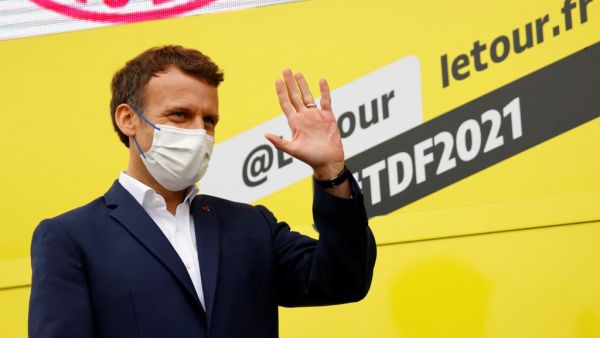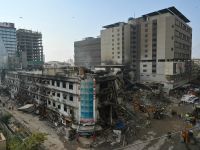According to the French foreign ministry, President Emmanuel Macron set to host a new international conference on Lebanon on the day of the first anniversary of the Beirut port blast. The announcement came after Lebanon's Designate-PM Saad Hariri gave up trying to form a new cabinet.
Lebanese political sources said that the French announcement reflects the exasperation of Paris over the failure of Lebanon’s leaders to end a political and economic crisis that dates back to well before the explosion.
#Lebanon #France : #Macron to host new international conference on Lebanon on August 4th - anniversary of #BeirutBlast - after #Hariri gave up efforts to form government in latest evidence of political paralysis pic.twitter.com/4JFuxCQqKu
— sebastian usher (@sebusher) July 16, 2021
Hariri stepped down Thursday, saying he was unable to form a government, nine months after accepting the challenge and as the country sinks deeper into crisis.
Macron will organise the international conference on August 4 with the help of the United Nations, “to respond to the needs of the Lebanese whose situation is deteriorating every day,” it said in a statement.
The French leader had in August 2020 hosted a first aid conference in the wake of the deadly August 4 Beirut port explosion that shattered the Lebanese capital, rallying some €250 million in pledges.
The Lebanese sources, who spoke on condition of anonymity, explained to The Arab Weekly that France is particularly frustrated with the political class that has been responsible for the cabinet formation deadlock.
Paris, the sources said, is mostly angry at Hariri, who wasted nine whole months and failed to push the French reform initiative to resolve the country’s crisis
Paris is also angry at President Michel Aoun, who blocked Hariri’s moves and rejected the initiative of Parliament Speaker Nabih Berri.
Aoun, observers believe, has tried to maintain the status quo and the existing power balances so as to serve the agenda of political ally Hezbollah and his son-in-law, the leader of the Free Patriotic Movement, Gibran Bassil.
The French foreign ministry said Friday Hariri’s failure to form a government “confirms the political deadlock which Lebanese leaders have deliberately continued for months, even as Lebanon sinks into an unprecedented economic and social crisis.”
There is now an “absolute urgency” to remove this “deliberate and unacceptable obstacle” and allow the formation of a government in Lebanon and the rapid appointment of a prime minister, the statement added.
Experts argue that France has abandoned diplomatic niceties and started sending direct messages to Lebanese officials, threatening to impose sanctions.
This comes as donors are pledging any aid will be coordinated by the UN and delivered directly to the Lebanese people, in a clear rebuke of the country’s entrenched and notoriously corrupt leaders.
The international community is also frustrated with the slow pace of investigations in Lebanon, when it comes to cases of assassinations and corruption.
The factors make Lebanese politicians, including Hariri, increasingly wary about being targeted by French-European sanctions, including a travel ban.
The European Union said earlier this week it wanted to agree by the end of July the legal framework for a sanctions regime targeting Lebanese leaders, but cautioned that the measure would not be imposed immediately.
The EU first needs to set up a sanctions regime that could then see individuals hit by travel bans and asset freezes, although it may also decide to not list anybody immediately.
Criteria for EU sanctions such as travel bans and asset freezes for Lebanese politicians are likely to include corruption, obstructing efforts to form a government, financial misdeeds and human rights abuses, according to a diplomatic note.
The pressure of the EU and other Western nations is likely to ratchet up in the coming days, especially after Hariri’s departure which leaves the country rudderless at a time when Lebanese people are facing soaring poverty, a plummeting currency and shortages of basic items from medicine to fuel.
The EU’s foreign policy chief, Josep Borrell, said Friday Lebanese leaders are responsible for solving “the current domestic, self-made crisis,” adding that it is urgent to form a new cabinet quickly. He said that an agreement with the International Monetary Fund remains essential to rescue the country from financial collapse.
Macron to Host New International Conference on #Lebanon Aug 4 https://t.co/FcRf5uUuUY
— Asharq Al-Awsat English (@aawsat_eng) July 16, 2021
“Lebanon’s stability and prosperity are crucial for the whole region and for Europe,” Borrell added in a statement.
In the US, the Biden administration expressed disappointment that Lebanese political leaders have squandered the last nine months since Hariri was named.
“All concerned parties need to work with urgency to put in place a government that’s able to implement reforms immediately,” tweeted US Secretary of State Antony Blinken.
President Aoun will now have to call on parliament to pick a new premier-designate, who will be tasked with assembling another cabinet. That in turn will have to be approved by the president and political factions.
This takes the political process back to square one, prompting Lebanese media to warn of many more months of drift, a delay the country can ill afford.
With cabinet and parliamentary seats distributed on confessional lines, negotiations will be further complicated by the exit of Hariri, a key figure among the country’s Sunni Muslims.
Media reports have circulated the name of former premier Najib Mikati, last in power in 2014, as a likely replacement.
But Hariri has said he would not endorse Mikati’s candidacy.
Hariri has previously led three governments in Lebanon and is the second candidate to fail at forming a cabinet in less than a year.
He was nominated premier-designate in October 2020 to replace Mustapha Adib, a relatively unknown diplomat.
Adib had been nominated just weeks after the port explosion, but quit less than a month later over resistance to his proposed line up.
Outgoing Prime Minister Hassan Diab, who resigned in the wake of the August 4 explosion, has stayed on in a caretaker capacity until political leaders can agree on a new premier.
On Friday, president Aoun said that his country will be able to overcome the difficult situation it is currently going through at various levels. He made the statements during his meeting at the Presidential Palace, east of Beirut, with a delegation from the Notre Dame University-Louaize.
“Nothing should frustrate the Lebanese people, despite the severity of what they are exposed to,” Aoun added, pledging to make all efforts to resolve the country’s successive crises.
This article has been adapted from its original source.










